[Big read] Protracted turbulence ahead in the South China Sea
With the recent statement by ASEAN foreign ministers on maintaining and promoting stability in the maritime sphere in Southeast Asia, unease caused by rising tensions in the South China Sea is once again coming to the fore. How is the situation in the South China Sea set to develop in the coming months? Would the upcoming US presidential election have a major impact?
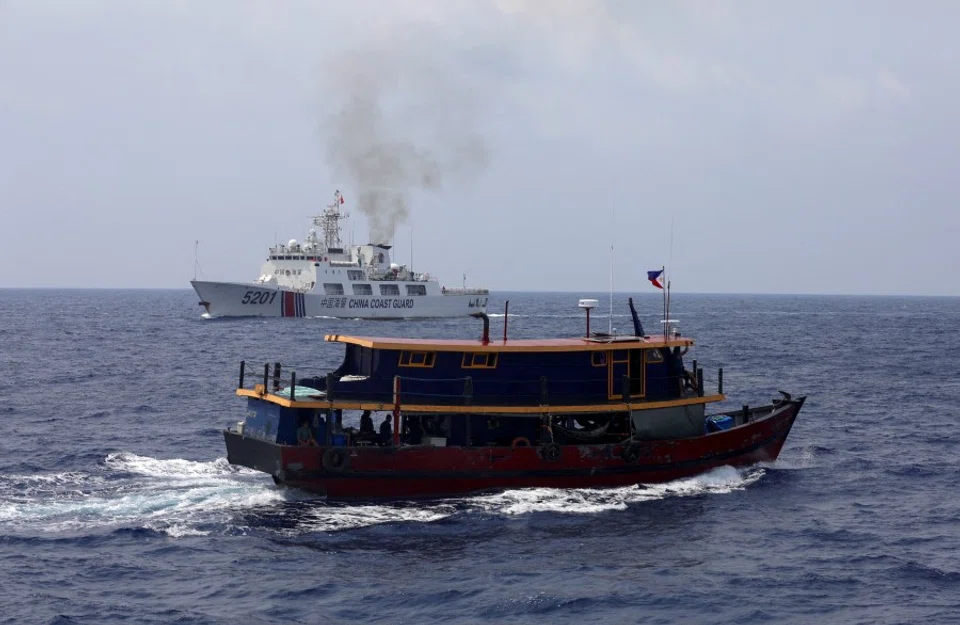
On the final weekend of 2023, the ASEAN foreign ministers issued a rare statement on maintaining and promoting stability in the maritime sphere in Southeast Asia, emphasising that the member states "closely follow with concern the recent developments in the South China Sea that may undermine peace, security, and stability in the region".
The statement highlights the unease caused by rising tensions in the South China Sea (SCS) in the past year and signals that this factor will continue to be one of the region's most important security issues in 2024.
Hardline positions
The tit-for-tat actions between the Philippines and China at the Second Thomas Shoal have become a major source of tension in the SCS, with at least eight incidents between the two sides in the area that have attracted global attention in the past year.
On 31 January, the China Coast Guard reported that it warned and drove off four Philippine personnel from intruding into the Scarborough Shoal, while the Philippines has expressed alarm at the growing presence of Chinese warships and military vessels around the Mischief Reef, where sovereignty is disputed.
Many analysts believe that China has continued to pressurise the Philippines indirectly in the past year through grey-zone actions, carefully avoiding direct conflict and tension escalation in the SCS.
Aries Arugay, a visiting senior fellow at Singapore's ISEAS-Yusof Ishak Institute said in an interview with Lianhe Zaobao that this trend would continue in 2024 and that "both sides would find it difficult to re-adjust their existing hard-line positions".
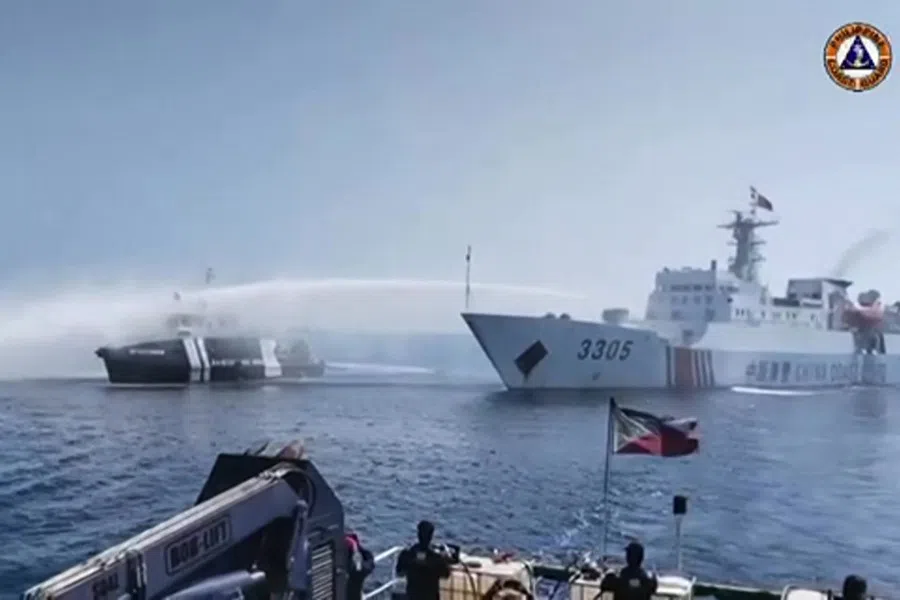
In the face of fierce maritime competition from China, the Philippines is focusing on strengthening itself in the SCS, which includes actively enhancing security cooperation with external parties.
After it agreed to expand the 2014 Enhanced Defense Cooperation Agreement with the US in March 2023, it intensively increased cooperation with US allies in the second half of the year.
The Philippines conducted joint military exercises with Canada and Australia in the SCS in September and November respectively, with the former involving naval resupply and the latter involving joint sea and air patrols. The warning to China is evident.
... external parties are strategically concerned that China's growing muscularity in the SCS would destabilise regional peace and security, obstruct their access to the waters, and disrupt their interests in the region. - Elina Noor, Senior Fellow, Asia Program, Carnegie Endowment for International Peace
The Philippines stepping up efforts to cooperate with external parties
The Philippines will continue to step up its naval cooperation with the US and its allies in 2024. Philippine Defence Secretary Gilberto Teodoro said this month that the Philippines is seeking a defence alliance with the US and other security partners for resource exploration in the SCS.
During a visit to the Philippines on 11 January 2024, German Foreign Minister Annalena Baerbock visited the Philippine Coast Guard's Manila headquarters and boarded a patrol vessel, as she expressed concerns from Europe about the situation in the SCS.
Teodoro said on 16 January 2024 that the Philippines seeks to sign a Reciprocal Access Agreement (RAA) with Japan in the first quarter of 2024 that would allow troop deployment on each other's territory. Negotiations have begun in November 2023, and the Philippines would be the third nation after Australia and the UK, as well as the first in Asia, to sign a RAA with Japan if an agreement is reached.
Teodoro also disclosed that the Philippines is also working on a memorandum of understanding with Canada to enhance defence cooperation.
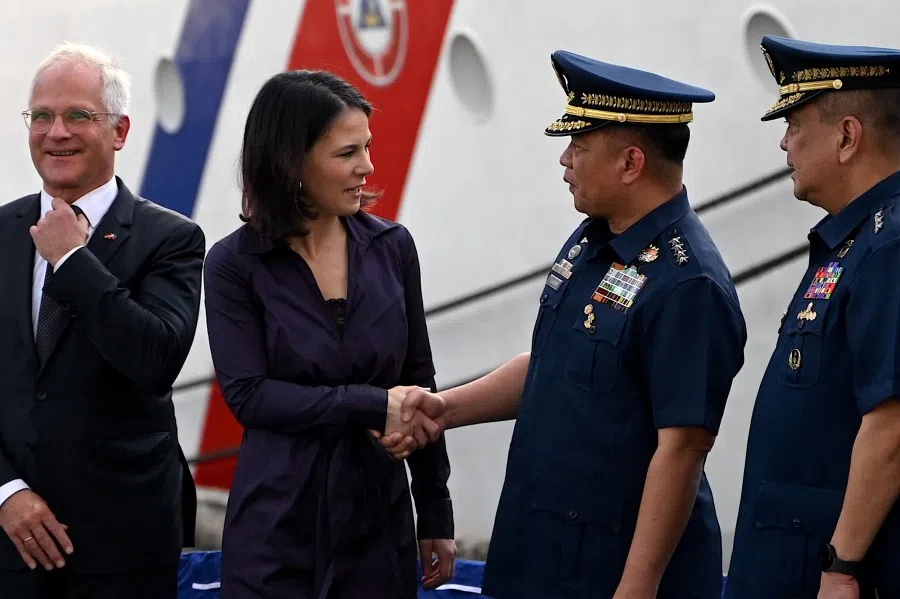
On 29 January 2024, the Philippine Daily Inquirer quoted Shambhu Kumaran, the Indian ambassador to Manila, as saying that the Philippines would "soon" take delivery of the first batch of the BrahMos supersonic cruise missiles from India. The Philippines signed the 18.9 billion pesos (US$334.4 million) missile purchase deal in 2022.
There is also news that the Philippines and the US are planning a meeting of senior foreign and defence officials in spring this year.
When interviewed, Elina Noor, a senior fellow in the Asia Program at the Carnegie Endowment for International Peace, said that these external parties are strategically concerned that China's growing muscularity in the SCS would destabilise regional peace and security, obstruct their access to the waters, and disrupt their interests in the region.
Noor believes that for some countries, like the Philippines, the interest of these external parties provides security assurance at testing times. However, for others, their presence is viewed more ambivalently, eliciting concerns of escalation and unintended consequences.
"There are real risks for further rise in tensions in the West Philippine Sea in the coming months, as all sides ramp up their measures and become more assertive." - Benjamin Blandin, Coordinator of Maritime Security, Yokosuka Council on Asia-Pacific Studies
When interviewed, Benjamin Blandin, coordinator of Maritime Security at Yokosuka Council on Asia-Pacific Studies, noted that the involvement of external parties in the SCS is not a brand new phenomenon and that this is merely receiving greater attention from the media and officials today, especially from the Philippine authorities.
He said: "There are real risks for further rise in tensions in the West Philippine Sea in the coming months, as all sides ramp up their measures and become more assertive."
Apart from increasing cooperation with external parties and arms purchases, the Philippines would also be developing nine Philippine-controlled islands in the SCS to make them more habitable for Philippine military personnel.
Vietnam's low-key approach in the South China Sea
Vietnam, another claimant in the SCS territorial dispute, has also been taking low-key actions in the past year, as it seeks to more carefully maintain a diplomatic balance between the US and China. In September 2023, it elevated its relations with the US to a comprehensive strategic partnership, the highest-level partnership, and in December deepened its comprehensive strategic cooperative partnership with China to a "China-Vietnam community with a shared future that carries strategic significance". Vietnam has translated this as the "Vietnam-China Community with a Shared Future having strategic significance".
Vietnam is also strengthening ties with the Philippines, with both agreeing this week to enhance cooperation between their coast guards in the SCS to prevent incidents. Meanwhile, Vietnam continues to carry out reclamation and island-building at the Spratly Islands (known as the Nansha Islands in China) in the SCS.
... a more consequential impact will be that ASEAN will become further divided and fragmented, as there is no uniform viewpoint on how to approach China on the issue of the SCS." - Ryu Yongwook, Assistant Professor of International Relations in East Asia, LKYSPP, NUS
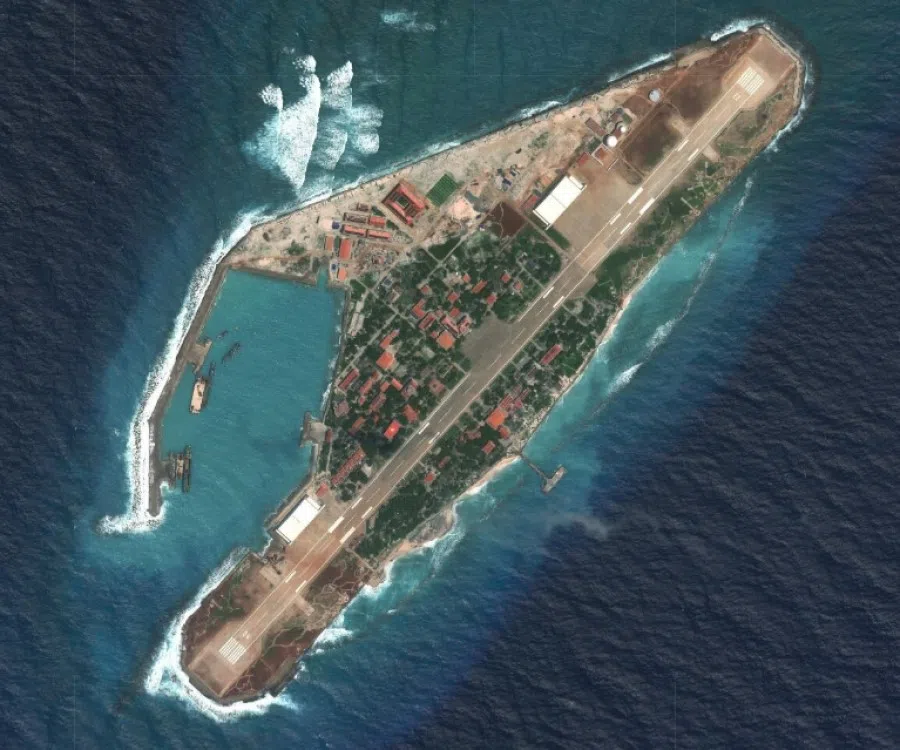
Ryu Yongwook, an assistant professor of international relations in East Asia at the Lee Kuan Yew School of Public Policy (LKYSPP) at the National University of Singapore (NUS), said in an interview that the intensified tensions in the SCS would not be positive for the development of China-ASEAN relations. "But a more consequential impact will be that ASEAN will become further divided and fragmented, as there is no uniform viewpoint on how to approach China on the issue of the SCS."
He added: "Some ASEAN members will blame external parties like the US or some other ASEAN member states for taking too hardline a stance, whereas some other members will blame China and the lack of support from other ASEAN member states to resist what they perceive to be China's expansive claims and aggressive military behaviour in the SCS."
Experts: breakthrough in the South China Sea COC unlikely this year
The Philippines is exploring the possibility of forging bilateral SCS Code of Conduct (COC) agreements with Vietnam and Malaysia in order to advance the COC negotiations. However, all the experts interviewed agree that a significant breakthrough for a COC is not expected this year.
ASEAN and China formally launched the negotiation process on a legally binding COC in 2018. Although the then Chinese Premier Li Keqiang put forward the goal to complete the COC consultations within three years; however, six years on, the consultations still seem a long way from concluding.
At the ASEAN-China Foreign Ministers' Meeting in July 2023, both sides said that the second reading of the Single Draft Negotiating Text (SDNT) of the COC has been completed. A set of guiding principles to expedite the negotiations has also been adopted.
In an interview, Ian Storey, a senior fellow at the ISEAS-Yusof Ishak Institute, said that ASEAN and China still have to resolve a number of difficult issues, including whether the COC would be legally binding, its geographical scope and a list of prohibited activities.
According to Blandin, the current COC negotiations are unlikely to make significant progress due to the difficulty in reaching a consensus on its scope and ultimate use. China does not want the COC to cover the Xisha Islands (the Paracel Islands, also known as the Hoang Sa archipelago in Vietnam) and Huangyan Island (the Scarborough Shoal, also known as the Panatag Shoal in the Philippines), because Vietnam and the Philippines have firm positions on these two areas.
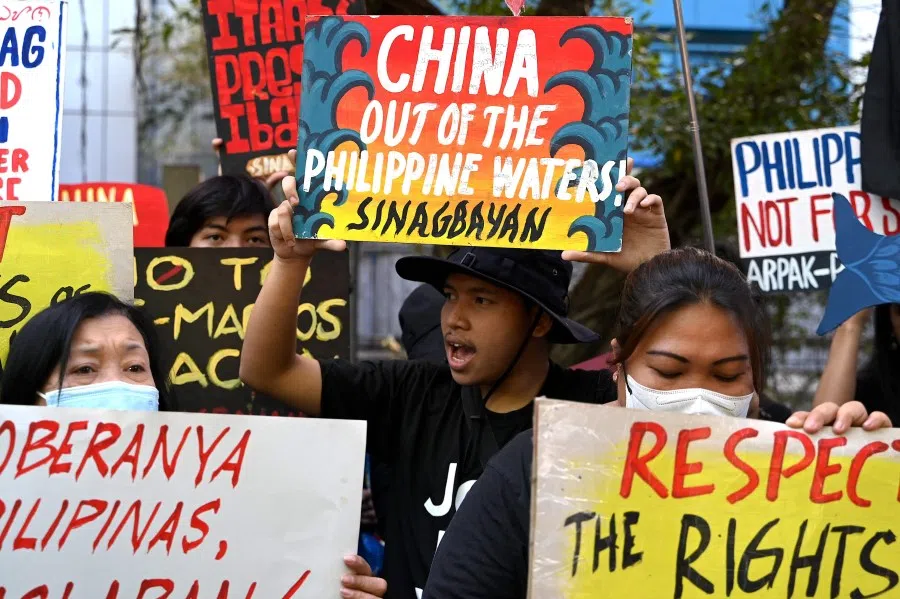
He said: "While China does not want the COC to be legally binding, ASEAN wants it to be so".
In November 2023, citing the lack of progress in the existing COC negotiations, the Philippines suggested that it would seek to explore separate sets of the SCS COC with Malaysia and Vietnam.
"A bigger issue is that the utility of concluding a binding COC has been declining for ASEAN because the situation in the SCS, including reclamation and militarisation of maritime features, has changed so much since the negotiations started." - Ryu
Peng Nian, a scholar in international relations and maritime security in the Indo-Pacific region, has written an article on the East Asia Forum website to highlight that Vietnam and Malaysia are unlikely to accept the Philippines' proposal to craft a separate COC. Unlike the Philippines, Vietnam has no intention of provoking China in the SCS, but prefers to adopt diplomacy in carefully managing its territorial disputes with China without undermining bilateral relations. Malaysia has historically maintained a non-confrontational approach to SCS disputes.
Ryu Yongwook said the Philippines' proposal would make it difficult to conclude a binding COC as the terms of the new proposal would likely be more restrictive for China. "But having a more demanding COC proposal may create greater impetus to the negotiating parties, especially China, to accept the current ongoing COC negotiations."
He added, "A bigger issue is that the utility of concluding a binding COC has been declining for ASEAN because the situation in the SCS, including reclamation and militarisation of maritime features, has changed so much since the negotiations started."
How will the US presidential election affect the South China Sea?
The US is the main counterweight for China in the SCS. With the approaching US presidential election this year, the international concern is how its outcome would affect US policy on the SCS.
Former US President Donald Trump is running aggressively for the US presidency again. While he reduced US military involvement in the SCS at the start of his previous US presidency, he hardened his stance in less than a year, rejecting "nearly all" of China's significant maritime claims in the SCS.
The number of US freedom of navigation operations in the disputed waters of the SCS has gradually tripled from two or three a year during the Obama era to nine in 2020.
"The approaches of Trump and Biden have been far more similar than either cares to admit." - Joseph Liow, Dean, College of Humanities, Arts, & Social Sciences, NTU
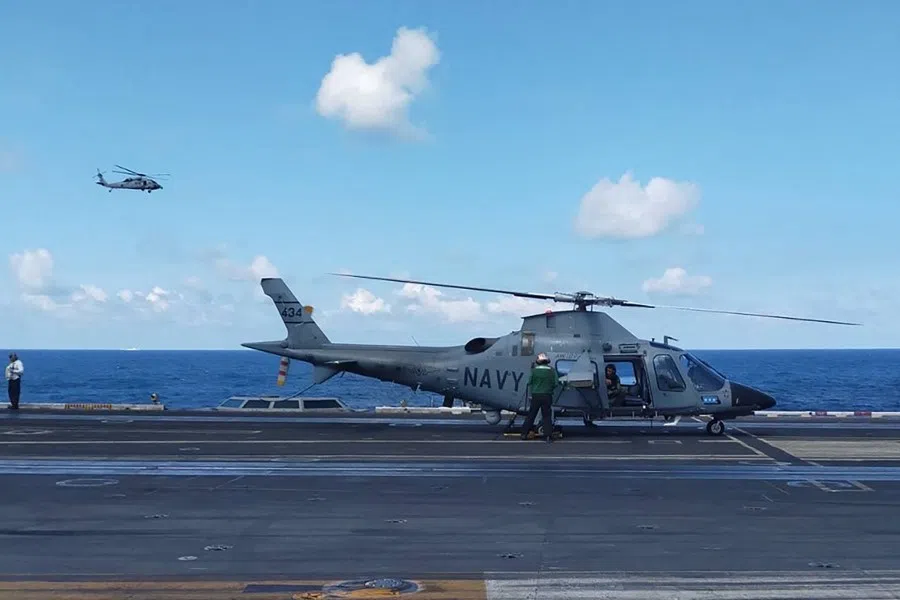
After President Joe Biden took office in 2021, he has broadly continued Trump's SCS policy, while actively strengthening regional cooperation with allies through mechanisms such as the Quadrilateral Security Dialogue (Quad) and the Australia-UK-US (AUKUS) trilateral security partnership.
Joseph Liow, the dean of the College of Humanities, Arts, & Social Sciences at the Nanyang Technological University (NTU), said in an interview that the US presidential election is not expected to significantly change the situation in the SCS. "The approaches of Trump and Biden have been far more similar than either cares to admit."
Ryu Yongwook said the US presidential election would impact the US approach to the SCS only if there is a change of government. But even If Trump returns to power, there would not be much change in the US policy on the SCS.
He said: "We might see a more transactionalist approach taken by the US in the SCS, implying that the Trump administration might require more contribution and concessions from regional countries."
Arugay feels that continued US involvement in the region cannot be taken for granted as the US policy on the SCS is likely to be influenced by domestic politics. Hence, "the Philippines is seeking to build more diversified security cooperation rather than putting all its eggs in the US basket".
This article was first published in Lianhe Zaobao as "各方行为准则磋商进展缓慢 南中国海夜长暗流多".


![[Big read] When the Arctic opens, what happens to Singapore?](https://cassette.sphdigital.com.sg/image/thinkchina/da65edebca34645c711c55e83e9877109b3c53847ebb1305573974651df1d13a)


